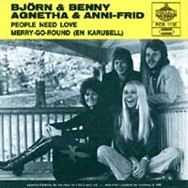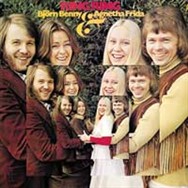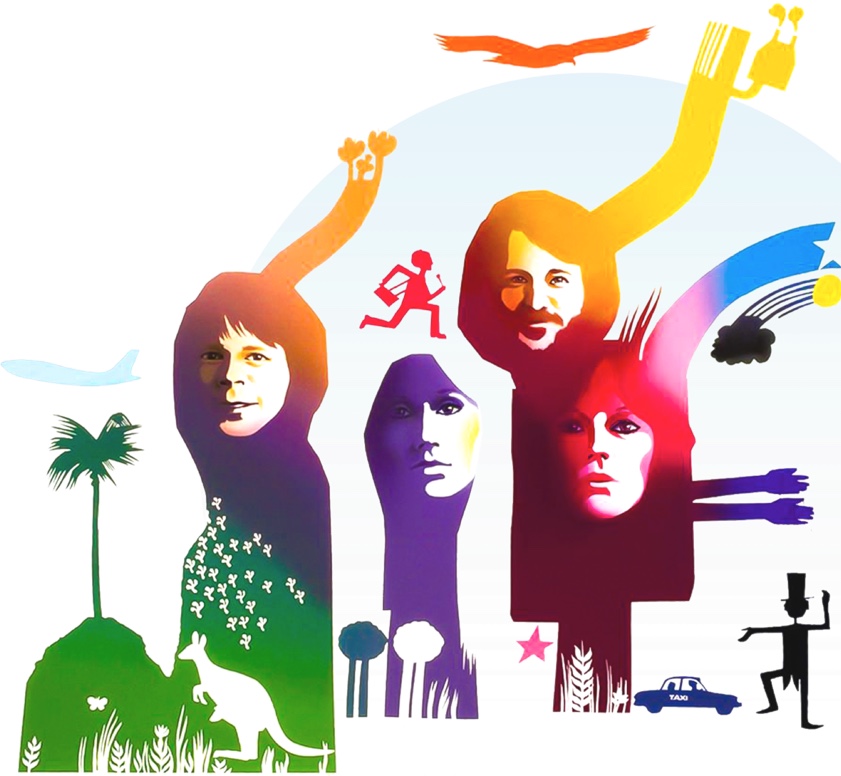In focus: ABBA In Sweden
In conjunction with the Swedish premiere of the Mamma Mia! musical on February 12, 2005, we explored ABBA’s relationship with their home country.

When the story of a massively popular group such as ABBA is told, it is almost inevitable that parts of it are over-simplified. For example, the four members are often reduced to stereotyped personalities, the group’s music described as exclusively upbeat and happy despite evidence to the contrary – and so on. Another frequently repeated “myth” is that ABBA were never appreciated in their home country of Sweden. Although it is partly true that there was heavy resistance towards ABBA from certain critics and cultural commentators, this is not the full story. In fact, speaking from a purely statistical point of view – chart positions, album sales per capita, and so on – it could be said that ABBA were more popular in Sweden than almost anywhere else. The difference is rather that the Swedes afforded the group a more quiet form of massive admiration than, for example, the explosive Abbamania that hit Australia in the mid-1970s.


The success was further consolidated in April the following year, when the two singles of ‘Ring Ring’ – the Swedish and the English versions – and the album of the same name occupied the top three placings on the chart for two weeks in a row. The album eventually peaked at number two, stopped from reaching the summit only by the Swedish ’Ring Ring’ single. Again, had there been two separate charts the album would have reached number one, meaning that Sweden is the only country where each and every one of ABBA’s eight studio albums reached the top of the charts.
However, during the time that the Swedes were falling in love with the magic combination of Agnetha, Björn, Benny and Frida, there was also a parallel development in the world of domestic popular music. The so-called Music Movement set the tone for much of the cultural agenda, demanding that “real” music must have a strong political left-wing message and wanting to free it from the demands of the commercial music business, the motto often being that “everyone can play”. This was the exact opposite of everything that ABBA wanted to achieve: they were striving for musical perfection and professionalism, and as far as messages were concerned, they simply wanted to entertain. It didn’t help that they were so closely associated with their manager and record company owner, Stig Anderson, who was even more vehemently opposed to all that the Music Movement stood for – and who wasn’t afraid to voice his opinion in the media. This fact, combined with ABBA’s massive commercial success, made the group easy targets for those who reacted with outrage against even the smallest whiff of commercial pop.
In actual fact though, for most people – who wouldn’t have been active in the Music Movement or had any influence whatsoever on the current cultural agenda – the opinions of critics and commentators were largely irrelevant. They simply responded to the music they heard, and as the 1970s progressed ABBA grew ever more popular. The Waterloo album was even more successful than Ring Ring, and for a while each new ABBA album broke the record set by the previous one. Arrival, released in 1976, was said to have sold 740,000 copies, which pretty much meant that 10 per cent of the Swedish population had bought a copy of the album.

The resistance towards ABBA from certain critics also spread into the world of radio and television. Admittedly, though, it was a bad time for pop music in general in these media. Some viewed radio chart shows with suspicion, seeing as they functioned very much as “advertisements” for the most commercial songs. Throughout the Seventies, although there always seemed to be some kind of chart programme, they were constantly attacked, often revised and frequently cancelled. The same went for television where there were scant few pop programmes – certainly nothing, for instance, such as Great Britain’s Top Of The Pops. ABBA’s famous promo clips were seldom if ever shown on Swedish television, simply because there was no natural outlet for them. The four clips made for the ABBA album – ‘Mamma Mia’, ‘SOS’, ‘Bang-A-Boomerang’ and ‘I Do, I Do, I Do, I Do, I Do’ – were broadcast as one long film, in a stand-alone programme entitled 4 x ABBA.
 This also goes some way towards explaining the somewhat astonishing fact that many of the most popular ABBA singles were never released in their home country. Although the group’s Swedish record company, Polar Music, issued singles of international mega-hits such as ‘SOS’, ‘Knowing Me, Knowing You’ and ‘Take A Chance On Me’, they were only released in the other Scandinavian countries. The radio climate being what it was, ABBA and Polar reasoned that there was no point in issuing singles that stood little chance of receiving any airplay. There was also the additional reason that Swedes tended to buy albums rather than singles. A glance at the Swedish charts seems to confirm that this was indeed true for ABBA. After ‘Waterloo’, there were only two singles that went to number one: ‘Dancing Queen’ and ‘Summer Night City’ (notably, the latter was not available on any studio album). Singles such as the 1977 release ‘The Name Of The Game’ stalled at number two in a year dominated by “freak” hits from acts such as Baccara, Boney M, Barbi Benton and the bird song imitator Jan Lindblad. In the case of ABBA, it seems many prospective buyers simply noted that the single had been released, but then decided to “wait for the album”.
This also goes some way towards explaining the somewhat astonishing fact that many of the most popular ABBA singles were never released in their home country. Although the group’s Swedish record company, Polar Music, issued singles of international mega-hits such as ‘SOS’, ‘Knowing Me, Knowing You’ and ‘Take A Chance On Me’, they were only released in the other Scandinavian countries. The radio climate being what it was, ABBA and Polar reasoned that there was no point in issuing singles that stood little chance of receiving any airplay. There was also the additional reason that Swedes tended to buy albums rather than singles. A glance at the Swedish charts seems to confirm that this was indeed true for ABBA. After ‘Waterloo’, there were only two singles that went to number one: ‘Dancing Queen’ and ‘Summer Night City’ (notably, the latter was not available on any studio album). Singles such as the 1977 release ‘The Name Of The Game’ stalled at number two in a year dominated by “freak” hits from acts such as Baccara, Boney M, Barbi Benton and the bird song imitator Jan Lindblad. In the case of ABBA, it seems many prospective buyers simply noted that the single had been released, but then decided to “wait for the album”.
 On television, whereas you’d think that a massively popular group such as ABBA would be featured regularly, the group were seldom seen. Although this was probably partly because some viewed the group’s music as inappropriate, there was also the fact that the group were far too busy writing and recording songs, and also doing promotional work in other countries. Thus, West Germany and Australia, not Sweden, became the first countries to devote entire television specials to ABBA.
On television, whereas you’d think that a massively popular group such as ABBA would be featured regularly, the group were seldom seen. Although this was probably partly because some viewed the group’s music as inappropriate, there was also the fact that the group were far too busy writing and recording songs, and also doing promotional work in other countries. Thus, West Germany and Australia, not Sweden, became the first countries to devote entire television specials to ABBA.
Mamma Mia! comes to Sweden
That said, Swedish television did the first bona fide documentary about the group, entitled Abba-dabba-doo!! and broadcast in November 1976 (the programme actually received its first airing in Australia a week earlier in a re-edited version entitled ABBA From The Beginning). Earlier in the year ABBA had of course been bestowed the ultimate honour when they were chosen as the only pop act to perform on the televised gala tribute to Sweden’s King Carl XVI Gustaf and future Queen, Silvia Sommerlath. The gala was broadcast on the eve of the royal couple’s wedding in June 1976.
After ABBA finally called it a day at the end of 1982, Sweden continued its extraordinary loyalty towards the former members. For instance, whereas Frida and Agnetha’s English language solo albums met with limited success in other countries, they were all hugely successful in Sweden, most of them peaking at number one or two on the album chart. This constantly massive popularity for ABBA individually and collectively gives Sweden the status as the most loyal stronghold for the group, despite the many negative judgements bestowed them in the newspapers. And with the approach of the 1980s and the attendant changes in the cultural climate, admitting to be an ABBA fan became significantly less controversial than it was during the band’s heyday.
So now that we’re approaching the opening date for the Mamma Mia! musical in Stockholm, Sweden, there might be good reason to ask why it has taken almost six years since the London premiere before the show reached ABBA’s home country. The main answer is simply that Björn and Benny originally didn’t want to translate the show into any other languages whatsoever. They felt that the ABBA songs were written to be performed in English, which meant that the entire show could only be performed in English. Eventually they were persuaded to try the concept with stagings in places such as Germany and The Netherlands. Contrary to their expectations it turned out to work very well, and so the possibility was considered to try a Swedish version. A number of the early ABBA songs – such as ‘Waterloo’ and ‘SOS’ – had in fact been recorded in Swedish by the group or its individual members, featuring lyrics by Stig Anderson. However, for the production of Mamma Mia! all lyrics have been rewritten from scratch by Niklas Strömstedt – a popular singer and songwriter in Sweden – and Björn Ulvaeus.
With the Stockholm production Mamma Mia! proving to be an instant sell-out success the moment the tickets were issued, it seems the Swedish loyalty to ABBA and everything connected to them is as strong as ever.
